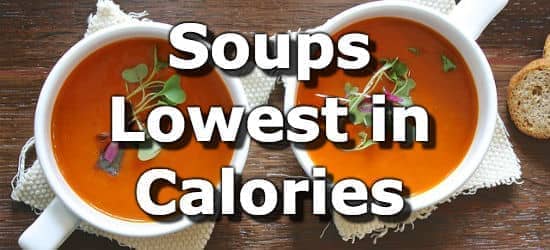A Soup Calorie Ranking from Lowest to Highest

Soups often enter weight loss diet plans, but not all soups are created equal. Which soup to choose? According to the ranking below it is best to choose water-based soups which are lower in fat and calories than cream-based soups.
The serving sizes presented below are per 8oz cup, which is the standard cup use in baking and cooking. Most people will consume 1-2 cups of soup per serving.
Below is a ranking of soups by calorie from lowest to highest. Soup broths have the fewest calories, as they also have the fewest ingredients. Other soups low in calories include chicken noodle, egg drop soup, vegetable soup, and wonton soup. Different recipes affect the caloric content of any of these soups. Any high calorie foods added to these soups will increase the caloric content. Pay attention to ingredients.
In general, the more water a soup contains the fewer calories it will have. For more diet ideas see the article on low-calorie foods.
List of Low Calorie Soups
| Soup | Calories Per 8oz Cup | Percent Water |
|---|---|---|
| #1 Soup Broth | 11 calories (1% DV) | 98% |
| #2 Chicken Broth | 15 calories (1% DV) | 98% |
| #3 Beef Broth | 31 calories (2% DV) | 96% |
| #4 Fish Broth | 39 calories (2% DV) | 96% |
| #5 Chicken Noodle Soup | 62 calories (3% DV) | 94% |
| #6 Egg Drop Soup | 65 calories (3% DV) | 93% |
| #7 Vegetable Soup | 67 calories (3% DV) | 92% |
| #8 Wonton Soup | 71 calories (4% DV) | 91% |
| #9 Turkey Vegetable Soup | 72 calories (4% DV) | 93% |
| #10 Beef Mushroom Soup | 73 calories (4% DV) | 93% |
| #11 Cream of Potato | 73 calories (4% DV) | 92% |
| #12 Mushroom Barley Soup | 73 calories (4% DV) | 92% |
| #13 Tomato Soup | 74 calories (4% DV) | 91% |
| #14 Manhattan Clam Chowder | 75 calories (4% DV) | 92% |
| #15 Minestrone | 82 calories (4% DV) | 91% |
| #16 Beef Noodle Soup | 83 calories (4% DV) | 92% |
| #17 Vegetable Chicken Soup | 84 calories (4% DV) | 92% |
| #18 New England Clam Chowder | 87 calories (4% DV) | 91% |
| #19 Chicken and Rice Soup | 89 calories (4% DV) | 90% |
| #20 Hot and Sour Soup | 91 calories (5% DV) | 91% |
| #21 Cream Of Mushroom Soup | 97 calories (5% DV) | 92% |
About the Data
Data for the curated food lists comes from the USDA Food Data Central Repository.
You can check our data against the USDA by clicking the (Source) link at the bottom of each food listing.
Note: When checking data please be sure the serving sizes are the same. In the rare case you find any difference, please contact us and we will fix it right away.
About Nutrient Targets
Setting targets can provide a guide to healthy eating.
Some of the most popular targets include:- Daily Value (%DV) - The daily value (%DV) is a general guideline for consumption that will prevent deficiency of a particular nutrient in most people. The %DV refers to the percentage of an amount that's found in a single serving of a food. It also accounts for absorption factors. It is set by the U.S. FDA.
- Recommended Dietary Allowance (%RDA) - The RDA sets an average daily dietary intake level that is sufficient to meet the nutrient requirements of nearly all (97.5%) healthy individuals. It's more specific than the daily value, and varies by age and gender. The RDA is set by the US National Instutites of Health.
- Reference Dietary Intake (%RDI) -The reference dietary intake is similar to the recommended daily allowance, but is specific to age and gender. The RDI for amino acids is set by the U.N. World Health Organization.
- Adequate Intake (%AI) - This value is primarily used in reference to omega-3 and omega-6 fats. The Adequate Intake is set by the U.S. Institute of Medicine. Because there is less evidence to determine the ideal targets for consumption of these nutrients, the specific amount is considered to be less reliable. Using the term Adequate Intake, rather than one of the other terms, helps to emphasize that the ideal intake of that particular nutrient has not yet been scientifically determined.
See the Guide to Recommended Daily Intakes for more information.
Want to set your own targets? Sign up for an account and set custom targets in the daily meal planner.From the Nutrient Ranking Tool
Use the ranking tool links below to select foods and create your own food list to share or print.
- Foods High in Calories
- Foods Low in Calories
- Vegetables High in Calories
- Fruits High in Calories
- Vegetarian Foods High in Calories
- Nuts High in Calories
- Grains High in Calories
- Beans High in Calories
- Dairy High in Calories
- Breakfast Cereals High in Calories
- Fast Foods High in Calories
View more nutrients with the nutrient ranking tool, or see ratios with the nutrient ratio tool.
Related
Data Sources and References
Try the recipe nutrition calculator, or daily meal planner.
Create a free account to log and track foods.
